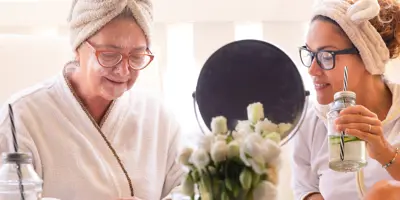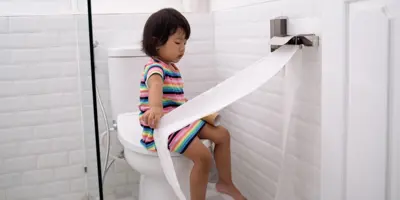71 people found this helpful

No one is born with perfect knowledge on how to have good feminine hygiene. Most of the time, we learn about feminine care from those around us – or online. The downside to this is that we often end up with many different—and sometimes confusing—opinions and sometimes contradictory advice.
Before we go into some of our feminine hygiene tips, allow us to lay down the basics with the definition of feminine hygiene. Feminine hygiene refers to any hygiene related to biologically female aspects of the body.1 Understanding feminine hygiene tips on feminine care is important for women to know how to take care of their bodies and how to make informed decisions about which products they’re using.
Whether you’re growing up and starting to learn about your own body for the first time or you’re wondering how to talk to your daughter about feminine care, here are our top ten feminine hygiene tips:
1. Feminine care 101: wipe properly
Wiping from front to back is a feminine care rule that most of us know well. But did your parents ever explain exactly why it’s an important part of personal hygiene for women? Not wiping properly when you use the toilet can leave germs in the wrong places, which can lead to uncomfortable infections. When it’s your turn to pass on this advice, encourage toddlers to wipe from front to back as soon as they start potty training, so they develop good habits right from the beginning.2
Tip: Take care down there with toilet paper that is soft, absorbent and strong, like Cushelle. With its luxurious comfort zone, just one sheet can do the trick.
2. Follow up with moist tissue
When we have dirty hands, we don’t just wipe them on a dry towel, right? We wash them with soap and water. Well, the same rule applies when you’ve used the toilet. After you’ve dry wiped, be sure to wipe again with a flushable moist toilet tissue, which will not only leave you cleaner, but save you time (and paper), too.
3. You are what you eat (and drink)
This might come as a surprise but eating well is a key part of knowing how to have good female hygiene. For example, eating a lot of sugar has been associated with yeast infections3, so be conscious about what you’re putting into your body – remember, everything in moderation – to make sure you’re getting all the nutrients you need to thrive! And, as with just about everything, remember to drink plenty of water, especially when it comes to preventing UTI infections.
4. Be period-proud
Here are some period tips to note. Periods are unique, just like you. Sometimes, they can leave you feeling crampy, irritable, and bloated— and other times, you may barely notice them at all. Periods can differ from month to month and person to person, but remember, there’s nothing unhygienic or embarrassing about having your period. It’s completely natural!
Following medically-approved period tips with good vaginal hygiene, you can help yourself feel clean, comfortable and confident every day of the month. Keep a pack of Cushelle Quilted on hand when you’re on your period so that you can freshen up on the go throughout the day.
5. Discharge is normal and healthy
When it comes to female discharge, it’s easy to feel embarrassed. But don’t worry: female discharge is just your body’s natural feminine care system at work.4 However, if it starts to smell unpleasant or changes in texture or colour, be sure to reach out to your doctor just to make sure that everything is as it should be.
6. Intimate hygiene tips for UTIs
Examining your urine after you’ve been to the loo might not be the most appealing of intimate hygiene tips. But it could help you spot a urinary tract infection (UTI) early. Urine that has a cloudy appearance and that smells stronger than usual sometimes indicates a UTI.5 Drink lots of water and if it becomes painful when you urinate, seek advice from your doctor.
7. Let yourself breathe
We all love a breath of fresh air—and it’s no different when it comes to “down there.” Tight, synthetic clothes can cause warm, moist conditions (yeast infections’ favourite environment).6 Try sleeping in loose, cotton pyjamas to encourage air circulation and to keep the area dry, cool and healthy while you sleep.
8. Wash with clean water
Using aggressive soaps can upset the balance of the helpful bacteria that keep you healthy, which can cause infections and discomfort. Whenever possible, be sure to wash with only clean water. If you do want to use soap, choose an unscented female hygiene product, and rinse very well.
9. Be prepared
All the science in the world can’t give you an up-to-the-minute prediction of whether today is the wrong day to wear light-coloured jeans. So just try to keep a pad (or whatever you like to use) with you at all times. Caught short? Ask a friend! Most feminine hygiene products recommend changing or emptying every four hours or so–or, if you have a heavy flow, as soon as you notice that it’s time.
10. Talk about feminine hygiene
The last of our feminine hygiene tips is for readers of every age. We’re not born knowing how to have good feminine hygiene. It’s something we learn from our mums, dads, siblings, friends and teachers. That’s why asking for feminine hygiene advice is nothing to be ashamed of.
Be honest about what you do and don’t know and learn more from your family, doctor or trusted sites on the internet. If you can talk openly about vaginal hygiene, others around you will find it easier to do the same.
So there you have it: 10 tips on personal hygiene for women. Whether you’ve just had your period for the first time or you’re going through menopause or maybe you have a younger female family member asking questions, these tips are sure to give you a top score in feminine care 101. If in doubt, always remember to reach out to your doctor for any questions or concerns you may have.
Sources
1 Collins Dictionary; Feminine Hygiene
2 Chesterfield Royal Hospital; NHS; Teaching your child how to wipe his bottom
3 The Interplay Between Sugar and Yeast Infections, National Library of Medicine
4 Is my vagina normal?, NHS Go
Related articles
Why do we cry? 10 reasons why people cry
Why do people cry and what are some causes of crying? Get answers to the question ‘what does crying do?’ and find out about what causes crying, here.

Simple yet decadent home spa ideas to help you unwind
Need some pampering? You can treat yourself at home by creating your own DIY home spa. From treatments to setting the scene, discover spa night ideas here.

A guide to healthy urine: colour chart and meaning of your pee colour
Do you know what healthy urine colour looks like? Or the signs of dehydration or infection? Learn the urine colour chart and meaning to check your health.

What is a normal stool colour? A guide with poo chart
What is a normal stool colour? Discover everything you didn’t know you needed to know about poo using our stool chart and handy guide.

How to poo properly: 4 tips for the correct way to poop
We've put together this handy guide packed full of tips for happier, more healthy bowel movement. Read on for our 4 tips for how to poo properly!

Why do men pee while standing?
Being able to urinate standing can come with unexpected challenges. Wondering how to pee properly? Men: here’s some advice on urinating; sitting or standing.




